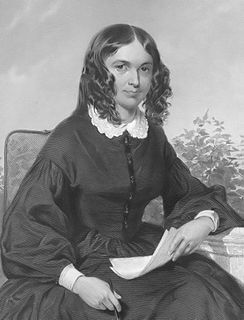
Elizabeth Barrett Browning was an English poet of the Victorian era, popular in Britain and the United States during her lifetime.

The Barretts of Wimpole Street is a 1934 American film directed by Sidney Franklin depicting the real-life romance between poets Elizabeth Barrett and Robert Browning, despite the opposition of her abusive father Edward Moulton-Barrett. The film was nominated for the Academy Award for Best Picture and Shearer was nominated for the Academy Award for Best Actress. It was written by Ernest Vajda, Claudine West and Donald Ogden Stewart, from the successful 1930 play The Barretts of Wimpole Street by Rudolf Besier, and starring Katharine Cornell.

Robert Browning was an English poet and playwright whose dramatic monologues put him high among the Victorian poets. His verse was noted for irony, characterization, dark humour, social commentary, historical settings and challenging vocabulary and syntax. His career began well – the long poems Pauline (1833) and Paracelsus (1835) were acclaimed – but his reputation shrank for a time – his 1840 poem Sordello was seen as wilfully obscure – and took over a decade to recover, by which time he had moved from Shelleyan forms to a more personal style. In 1846 Browning married the older poet Elizabeth Barrett and went to live in Italy. By her death in 1861 he had published the collection Men and Women (1855). His Dramatis Personae (1864) and book-length epic poem The Ring and the Book (1868–1869) made him a leading British poet. He continued to be prolific, but his reputation today rests mainly on his middle period. By his death in 1889 he was seen as a sage and philosopher-poet who had fed into Victorian social and political discourse. Societies for studying his work formed in his lifetime and survived in Britain and the US into the 20th century.

Dame Daphne du Maurier, Lady Browning, was an English author and playwright.
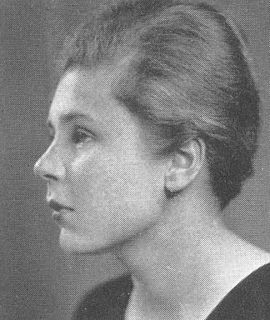
Elizabeth Bishop was an American poet and short-story writer. She was Consultant in Poetry to the Library of Congress from 1949 to 1950, the Pulitzer Prize winner for Poetry in 1956, the National Book Award winner in 1970, and the recipient of the Neustadt International Prize for Literature in 1976. Dwight Garner argued that she was perhaps "the most purely gifted poet of the 20th century."

Sarah Margaret Fuller Ossoli was an American journalist, editor, critic, translator, and women's rights advocate associated with the American transcendentalism movement. She was the first American female war correspondent, writing for Horace Greeley's New-York Tribune, and full-time book reviewer in journalism. Her book Woman in the Nineteenth Century is considered the first major feminist work in the United States.

Margaret Forster was an English novelist, biographer, memoirist, historian and critic, best known for the 1965 novel Georgy Girl, made into a successful film of the same name, which inspired a hit song by The Seekers. Other successes were a 2003 novel, Diary of an Ordinary Woman, biographies of Daphne du Maurier and Elizabeth Barrett Browning, and her memoirs Hidden Lives and Precious Lives.
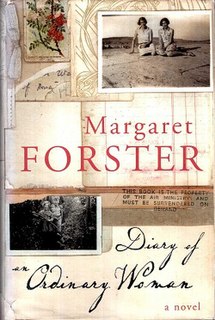
Diary of an Ordinary Woman is a novel by Margaret Forster, framed as an "edited" diary of a fictional woman who lives through most of the major events of the 20th century, covering the years 1914 to 1995. So realistic that many readers believed it to be an authentic diary, it is one of Forster's best-known novels.

Letitia Elizabeth Landon was an English poet and novelist, better known by her initials L.E.L.

Elizabeth Bowen CBE was an Anglo-Irish novelist and short story writer notable for her fiction about life in wartime London.

Sonnets from the Portuguese, written ca. 1845–1846 and published first in 1850, is a collection of 44 love sonnets written by Elizabeth Barrett Browning. The collection was acclaimed and popular during the poet's lifetime and it remains so.

Aurora Leigh (1856) is an epic poem/novel by Elizabeth Barrett Browning. The poem is written in blank verse and encompasses nine books. It is a first-person narration, from the point of view of Aurora; its other heroine, Marian Erle, is an abused self-taught child of itinerant parents. The poem is set in Florence, Malvern, London and Paris. The author uses her knowledge of Hebrew and Greek, while also playing off modern novels, such as Corinne ou l'Italie by Anne Louise Germaine de Staël and the novels by George Sand. As far as Book 5, Aurora narrates her past, from her childhood to the age of about 27; in Books 6–9, the narrative has caught up with her, and she reports events in diary form. Elizabeth Barrett Browning styled the poem "a novel in verse", and referred to it as "the most mature of my works, and the one into which my highest convictions upon Life and Art have entered". Scholar Deirdre David asserts that Barrett Browning's work in Aurora Leigh has made her into "a major figure in any consideration of the nineteenth-century woman writer and of Victorian poetry in general". John Ruskin called it the greatest long poem of the nineteenth century.

Howards End is a novel by E. M. Forster, first published in 1910, about social conventions, codes of conduct and relationships in turn-of-the-century England. Howards End is considered by many to be Forster's masterpiece. The book was conceived in June 1908 and worked on throughout the following year; it was completed in July 1910.

Flush: A Biography, an imaginative biography of Elizabeth Barrett Browning's cocker spaniel, is a cross-genre blend of fiction and nonfiction by Virginia Woolf published in 1933. Written after the completion of her emotionally draining The Waves, the work returned Woolf to the imaginative consideration of English history that she had begun in Orlando: A Biography, and to which she would return in Between the Acts.

The Cherryh Odyssey is a 2004 collection of essays by various academics, critics and authors about American Hugo Award-winning science fiction and fantasy author, C. J. Cherryh. It was edited by author and academic, Edward Carmien, and was published by Borgo Press, an imprint of Wildside Press as part of its Author Study series. Locus Magazine put the book on its "2004 Recommended Reading List", and Carmien received a nomination for the 2005 Locus Award for Best Non-fiction book for The Cherryh Odyssey.
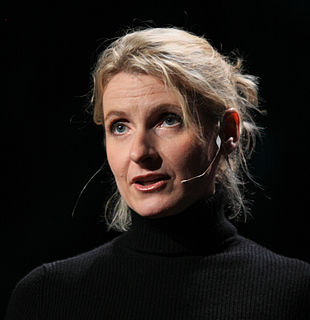
Elizabeth Gilbert is an American journalist and author. She is best known for her 2006 memoir, Eat, Pray, Love, which has sold over 12 million copies and has been translated into over 30 languages. The book was also made into a film of the same name in 2010.

Deirdre Barrett is an author and psychologist who teaches at Harvard Medical School. She is known for her research on dreams, hypnosis and imagery and has written on evolutionary psychology. Barrett is a Past President of The International Association for the Study of Dreams and of the American Psychological Association’s Div. 30, The Society for Psychological Hypnosis. She has written five books for the general public: Pandemic Dreams (2020), The Pregnant Man and Other Cases From a Hypnotherapist's Couch (1998), The Committee of Sleep (2001), Waistland (2007), and Supernormal Stimuli (2010). She is the editor of four academic books: Trauma and Dreams (1996), The New Science of Dreaming (2007), Hypnosis and Hypnotherapy (2010), and The Encyclopedia of Sleep and Dreams (2012). She is Editor in Chief of the journal Dreaming: The Journal of the Association for the Study of Dreams and a Consulting Editor for Imagination, Cognition, and Personality and The International Journal for Clinical and Experimental Hypnosis. Sleep paralysis is a state of mind which the dreamer cannot move or talk although they are aware that they are awake.
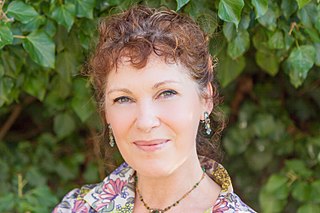
Rebecca Stott is a British writer and broadcaster, currently professor of Literature and Creative Writing at the University of East Anglia. She was elected a Fellow of the Royal Society of Literature in 2021.

Hope End is an area and former estate of Herefordshire, England, near the Malvern Hills, noted for its literary associations. As described by a 19th-century railway guide, Hope End Park and a country house lay near the West Midland Railway, between the stations at Colwall and Ledbury. Hope End House may refer to any one of three houses on the estate, all reduced and much altered from their original states. Hope End ward is a local government area that is more extensive than the old estate.

Two-Way Mirror: The Life of Elizabeth Barrett Browning is a 2021 book by British writer Fiona Sampson. The book examines the life of Victorian poet Elizabeth Barrett Browning, and is the first full biography of the poet in over 30 years. Sampson's analysis explores the personal life and political awakening of Barrett Browning.





















